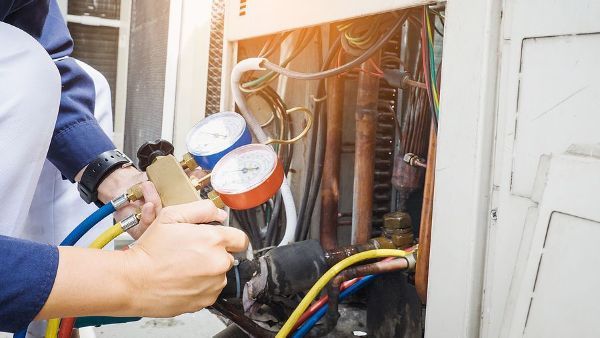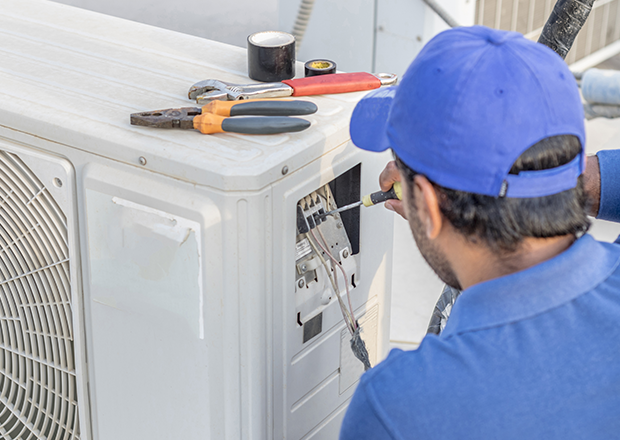How to perform a effective ac fix until the technician arrives
Understanding A/c: Common Troubles of Air Conditioner Devices and Their Solutions
Heating and cooling systems play a necessary function in keeping interior convenience. Air conditioning systems typically encounter usual issues that can hinder their efficiency. Concerns like poor air conditioning, unusual noises, and regular cycling can suggest much deeper mechanical concerns. On top of that, water leakages and unpleasant odors can compromise air high quality. Understanding these obstacles and their options is essential for effective upkeep. What steps can home owners take to guarantee their air conditioning units run efficiently?
Inadequate Cooling Performance
What causes poor cooling efficiency in a cooling and heating system? Several factors can contribute to this problem. A typical reason is a dirty air filter, which restricts airflow and minimizes cooling down effectiveness. In addition, reduced refrigerant degrees because of leaks can prevent the system's capacity to soak up warm efficiently. Another prospective problem may emerge from a malfunctioning thermostat, leading to incorrect temperature level analyses and improper air conditioning cycles. Obstructed or unclean condenser coils can additionally avoid warm dissipation, further impacting efficiency. Ductwork issues, such as leaks or obstructions, can result in uneven cooling throughout a room. Recognizing these problems quickly is necessary for preserving excellent cooling and heating function and guaranteeing a comfortable interior atmosphere. Routine maintenance and assessments can assist mitigate these issues and boost the system's general efficiency.
Unusual Sounds Coming From the AC Device
A range of unusual noises coming from an a/c device can suggest underlying concerns that call for attention. Typical noises consist of rattling, which might suggest loose elements or particles within the device. Hissing sounds typically aim to refrigerant leaks, endangering the system's performance. A grinding noise might show damaged bearings or electric motor problems, while a shrill screech could signify a trouble with the compressor or a sliding belt.
Each of these sounds acts as an indication that something may be awry, possibly resulting in even more significant damages if not resolved immediately. House owners ought to stay clear of disregarding these auditory signs and think about speaking with a certified a/c professional for medical diagnosis and repair service. Prompt intervention can not just bring back performance yet additionally prolong the life expectancy of the system. HVAC company. Identifying these noises as indicators of problem is essential for maintaining peak cooling efficiency
Regular Cycling On and Off
Constant cycling on and off can suggest ineffectiveness or malfunctions within a cooling and heating system, frequently described as short-cycling. This condition can bring about boosted energy usage and may create unneeded endure the device's parts. Numerous factors can add to this problem, consisting of a poorly sized air conditioning device, a malfunctioning thermostat, or filthy air filters. When an a/c device is also huge for the room, it cools too swiftly, triggering it to cycle often without properly evaporating the air. If the thermostat is damaged, it may incorrectly indicate the system to switch on and off. Additionally, obstructed or filthy air filters can limit air movement, motivating the system to work harder and cycle much more typically. Resolving these problems immediately is necessary to enhance performance, lengthen the lifespan of the HVAC system, and maintain suitable interior convenience.
Water Leakages and Drain Issues
Water leakages and water drainage concerns can present significant challenges for a/c systems, bring about potential damage and inadequacies. These problems usually originate from clogged condensate drains, which stop water from draining properly and can result in overflow. Additionally, damaged drainpipe pans or inappropriate installation may aggravate these leaks, creating water to gather in unwanted areas.
Regular maintenance is vital to stop such problems; ensuring that condensate lines are clear and drainpipe pans are intact can minimize the threat of leaks. Property owners ought to consistently inspect for indicators Get More Info of moisture around the device, as early discovery can stop much more extensive damages. In situations where leaks are determined, immediate activity is called for, which might consist of clearing blockages or changing damaged parts. Resolving water leakages and water drainage problems not just safeguards the cooling and heating system yet additionally keeps indoor air high quality and comfort.
Bad Smells and Air Top Quality Worries
Bad odors emanating from HVAC systems can indicate severe air top quality problems. Usual resources of these undesirable scents include mold and mildew, mildew, or microorganisms development in the ductwork, usually as a result of moisture buildup. If the system has an undesirable, musty official source odor, it may signify that the air filters are clogged or that there is not enough air flow, enabling impurities to distribute. Furthermore, a burning smell might suggest electrical concerns or overheating parts, needing immediate focus.
House owners ought to consistently replace air filters and timetable routine upkeep to assure peak air top quality. Making use of an air cleanser can likewise assist remove smells and enhance indoor air quality. If odors linger despite these procedures, expert assessment and cleansing may be needed to identify and resolve underlying concerns. HVAC company. Recognition of these odors is important, as they can impact wellness and comfort in interior environments

Regularly Asked Questions
How Typically Should I Schedule Air Conditioning Upkeep?
It is recommended to set up air conditioner upkeep at the very least annually, ideally before the air conditioning period starts. Regular evaluations can aid determine problems early, guaranteeing effective procedure and prolonging the life-span of the unit.

What Is the Ordinary Lifespan of an Air Conditioning Unit?
The typical lifespan of an AC unit typically varies from 15 to 20 years. Factors such as upkeep, usage patterns, and environmental problems can considerably affect this duration, influencing total performance and performance gradually.
Exactly how Do I Pick the Right Size A/c Unit for My Home?

What Are the Signs My Air Conditioning System Demands Substitute?

Can I Set Up an AC Unit Myself?
While mounting an a/c system oneself is feasible, it requires technical understanding and correct tools. HVAC contractor. Many people might encounter challenges with installation, potentially resulting in inefficiency or safety and security risks, making specialist help a good idea for optimal outcomes
Final thought
In summary, recognizing common heating and cooling issues and their solutions is essential for preserving reliable AC system performance. Attending to concerns such as insufficient cooling, unusual sounds, regular cycling, water leaks, and unpleasant odors can greatly improve interior convenience and air quality. Normal upkeep, including filter adjustments and timely fixings, plays a significant role in protecting against these problems. By remaining aggressive, homeowners can ensure their a/c systems run efficiently, eventually extending the life expectancy of their a/c devices.